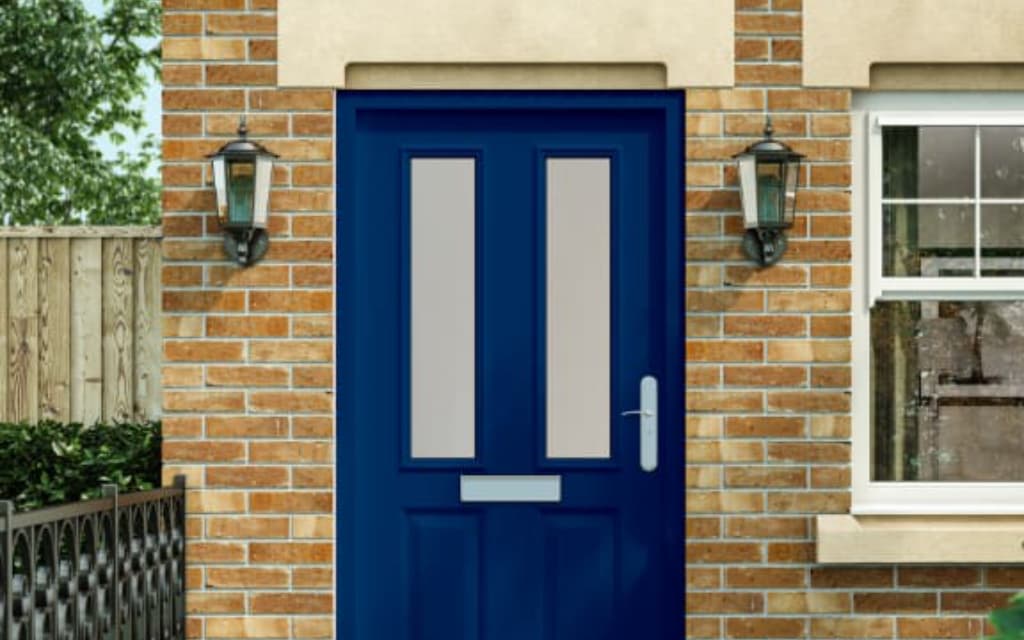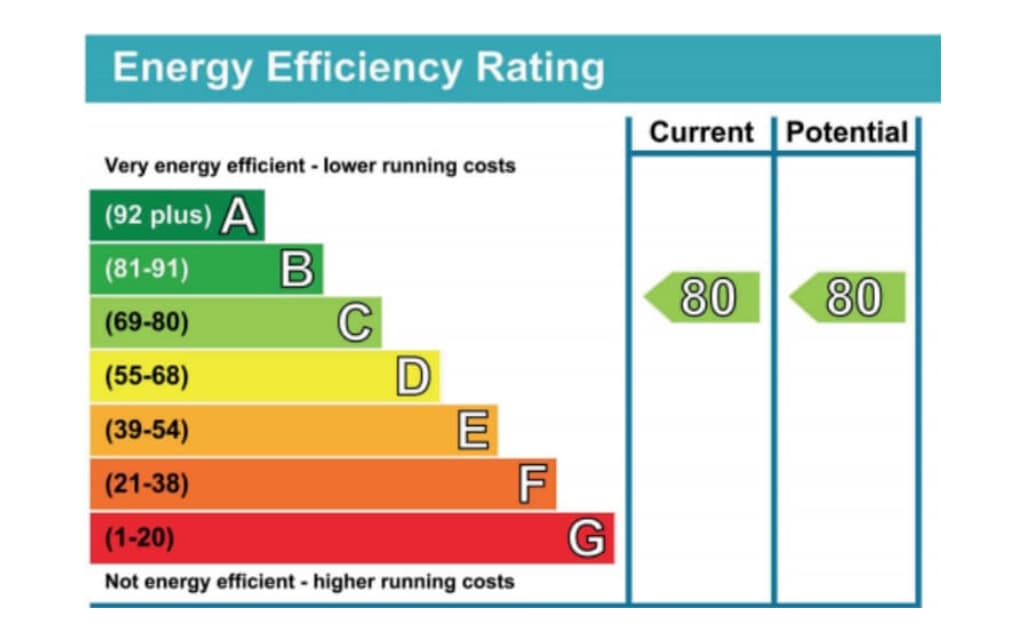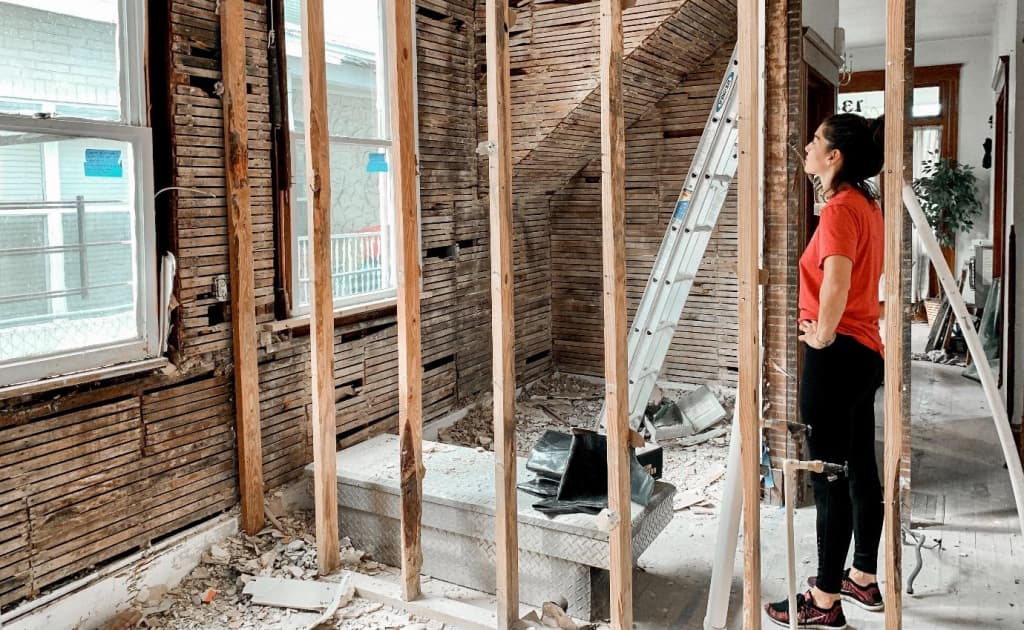
Embarking on a house refurbishment journey can seem daunting. However, equipped with the right information, you can navigate this task confidently.
This article will explain the average cost of refurbishing a house in the UK. We’ll explore a variety of factors that contribute to the overall house refurb cost, presenting them in a clear, digestible manner.
- 30-Second Information
- How Much Does It Cost to Renovate a House?
- House Renovation Costs in Detail
- Cost of an Extension
- Cost of Loft Conversion
- Cost of Garage Conversion
- Cost of Replacing Windows and Doors
- Rewiring Costs
- Roof Replacement Costs
- Costs for New Central Heating
- New Bathroom Costs
- Cost of a New Kitchen
- Cost of Insulation
- Wall Plastering and Rendering Costs
- Cost to Fix Damp
- Rot Treatment Costs
- Woodworm Treatment Costs
- Architect Costs
- Factors Affecting the House Renovation Costs
- How Long Does It Take to Renovate a House?
- How Can I Save Money When Renovating My Home?
- Should I Renovate My House or Move?
- Other FAQs
- Conclusion
Whether you’re tackling a small renovation or a full-scale house refurbishment, understanding the potential costs is crucial.
So, let’s begin this journey together, shedding light on the house refurbishment costs in the UK and empowering you with the knowledge to manage your renovation budget effectively.
30-Second Information
- The average cost to renovate a 2-bed house, typically a bungalow or terraced house around 688 – 1,087 sq. ft., is £107,350 + VAT.
- The cost of house renovation in the UK for a 3-bed house, usually a terraced home or semi-detached house, around 688 – 1,087 sq. ft., is also £107,350 + VAT.
- For a 4-bed house, typically a detached house with an average size of 1,582 sq. ft, the refurbishing house costs £167,460 + VAT.
- Always factor in a 10-15% contingency for unexpected issues in your refurbished house costs.
How Much Does It Cost to Renovate a House?

So, how much does house renovation cost? Well, every house renovation project is unique, comprising a diverse set of components that vary depending on the size and condition of the house.
We’ve prepared a comparative table to give you an insight into what a typical renovation could cost.
| Item (for an average house renovation) | The average cost for a 2-bedroom house UK (+VAT) | The average cost for a 3-bedroom house UK (+VAT) | The average cost for a 4-bedroom house UK (+VAT) |
|---|---|---|---|
| New gas supply | £810,00 | £1,500 | £2,400 |
| New heating system | £2,970 | £5,500 | £8,800 |
| Rewiring | £3,105 | £5,750 | £9,200 |
| Windows | £2,295 | £4,250 | £6,800 |
| Replaster walls | £2,160 | £4,000 | £6,400 |
| Replaster walls & ceilings (re-skim existing) | £6,480 | £12,000 | £19,200 |
| Replaster walls & ceilings (hack off existing) | £12,960 | £24,000 | £38,400 |
| Replace skirting throughout | £1,620 | £3,000 | £4,800 |
| Paint walls & ceilings | £3,240 | £6,000 | £9,600 |
| New cloakroom w/c (including tiling) | £1,080 | £2,000 | £3,200 |
| New kitchen | £9,450 | £17,500 | £28,000 |
| French doors | £1,350 | £2,500 | £4,000 |
| Kitchen extension (12 m2) | £10,530 | £19,500 | £31,200 |
| Skirtings for new extension | £189 | £350 | £560 |
| Knock down walls | £940 | £1,750 | £2,800 |
| TOTAL | £59,184 | £107,350 | £171,760 |
Above is a quick breakdown of the question, “How much does it cost to refurbish a house?”. Keep reading for a deeper, more comprehensive understanding of the prices included in this type of project.
House Renovation Costs in Detail
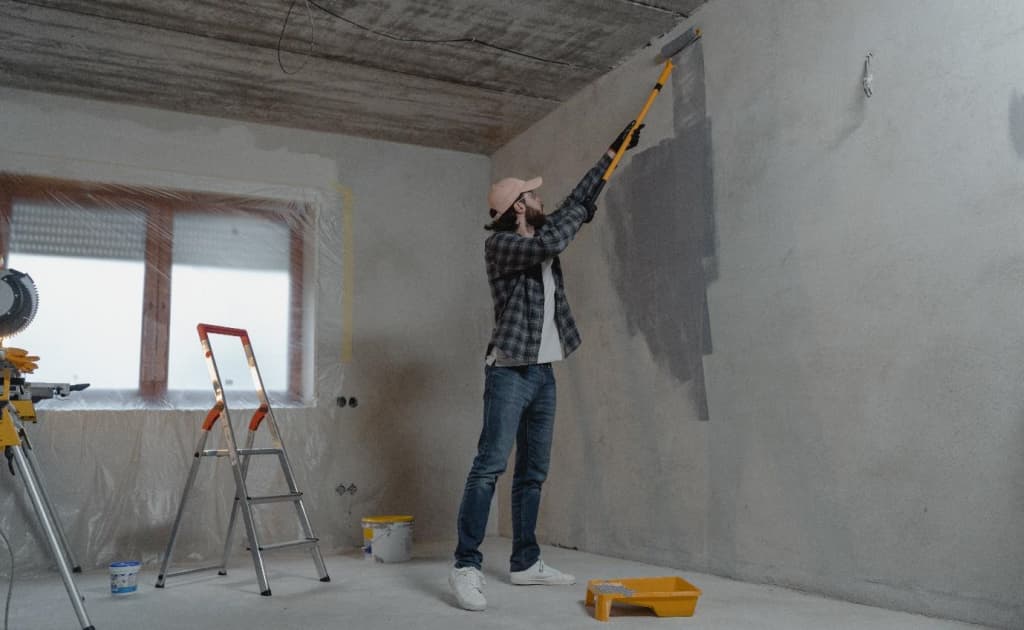
Cost of an Extension
Venturing on the journey of renovating a house in the UK presents homeowners with various factors to consider—a primary one being the cost of refurbishing a house.
The price of an extension is a significant contributor to this. The costs of extensions can be as diverse as the types of extensions available. From single-story extensions, multi-story extensions, and semi-detached extensions to basement extensions, each comes with its own set of costs and considerations.
These can range anywhere from £10,000 to a staggering £300,000. This broad range reflects the variability in different extension projects’ scale, design, and requirements.
However, if we drill down to specifics, on average, a typical 4m x 6m extension can cost between £26,000 and £34,000. This average cost gives you a reasonable estimate when contemplating the question of “how much to refurbish a house?”.
Cost of Loft Conversion
Loft conversions present another facet in the realm of house renovations. Not only does it add useful space, but a loft conversion also enhances the value of your property, increasing it by as much as 20%.
When considering the cost of refurbishing a house, it’s important to note that a loft conversion can start from a relatively modest £20,000. But be wary; house refurbishment costs can quickly escalate based on the type of loft conversion you select and the complexity of the required work.
From roof light/Velux conversions, dormer conversions, hip-to-gable conversions, and mansard conversions to L-shaped conversions, each type has its unique requirements and costs. The type that suits you best will depend on your property type and the amount you’re willing or able to spend.
To illustrate, consider a loft conversion with dormer windows, a bedroom, and an ensuite bathroom. According to MyBuilder, such a conversion can cost approximately £57,500.
A loft conversion offers great potential to increase your home’s value. It’s essential, however, to plan carefully and understand how such renovation costs can impact your overall house refurbishment.
Cost of Garage Conversion
Exploring further in the house renovation space, we encounter garage conversions. This clever home improvement strategy can add as much value to a property as a loft conversion, an average of 20%. But what about the cost of house refurbishment when embarking on such a project?
The beauty of a garage conversion lies in its affordability compared to other types of conversions. The main reason is the nature of the work involved. You already have the basic structure – the room – and the task is to convert it into a functional living space. As such, the work is typically less extensive than starting a loft conversion or extension from scratch.
According to Checkatrade, the cost for a garage conversion can range from £9,500 to £20,000, a range that depends on the size and style of the conversion. This makes it a compelling consideration for those pondering how much to refurb a house.
As you navigate the landscape of house renovation costs UK, weighing up all the options and costs is important. A garage conversion can be a cost-effective way to add significant value to your property, making it a valuable consideration in your overall house refurbishment cost.
Cost of Replacing Windows and Doors
Examining the facets of UK house renovation costs, we next consider the cost of replacing windows and doors. It’s important to acknowledge that necessary permissions are required before undertaking specific upgrades, such as installing double glazing.
For this, Gov.UK is the official platform to apply for planning permission. Regarding doors, replacements inside the house typically don’t require permission. However, alterations to your front door may need a review of your permitted development rights.
For those living in a listed building, i.e., a property that features on the National Heritage List for England (NHLE), you’ll need a listed building consent. This approval can be procured from your local planning authority.
Following the procurement of the green light, you can start budgeting for your window and door replacements. As per data provided by FMB, expect a cost range of £150 – £450 for an average-sized uPVC window (600mm x 900mm), installation included. For uPVC doors, the prices typically fall between £200 to £300, encompassing glazing and architrave. For more security, consider a steel front door which starts at £799.99 + VAT. If you’d like to read more about the differences between them, read our guide here.
Rewiring Costs
Delving into the intricate details of house renovation costs in the UK, we arrive at rewiring costs. Owners and landlords with older properties should know the criticality of a thorough electrical check.
Adherence to the stipulations of the Approved Document Part P of the Building Regulations is a legal requirement for all new electrical work in England and Wales. Violating these regulations could lead to legal action, with local authorities having the right to demand the modification or removal of the work.
The actual cost of rewiring your home will vary, influenced by factors like location, size, occupancy, and age of the property. However, here are the estimated house renovation costs regarding rewiring:
| Size of Property | Average UK Cost (+VAT) |
|---|---|
| 1-bed house | £4,200 |
| 2-bed house | £4,800 |
| 3-bed house | £6,225 |
| 4-bed house | £7,730 |
| 5-bed house | £10,000 |
We advise obtaining at least three quotes before settling on a service provider to ensure you get the best price. If you’re contemplating the 3-bed house refurbishment cost in the UK or the average cost of a full house renovation UK, seeking multiple quotes will provide a more accurate estimation.
Roof Replacement Costs
One of the significant expenditures in house renovation costs in the UK involves roof replacements. Your roof serves a crucial function, shielding your home from various weather conditions. Therefore, any damage warrants immediate attention, often necessitating repair or outright replacement.
If your property survey indicates the need for a new roof, it’s crucial to be prepared for the associated expenses. Here’s a guide to typical costs associated with different types of roof replacements, courtesy of Checkatrade:
- Hip roof replacement cost: £8,500 – £17,500
- Gable roof replacement cost: £7,500 – £16,250
- Flat roof replacement cost: £1,440 – £3,400
Remember, the costs can fluctuate depending on the specifics of your roof replacement project. Factors such as the type of tiles you select and whether the rafters need replacement affect the total expenditure. With this in mind, you can better evaluate the cost of renovating a house in the UK or the cost of a full house renovation.
Costs for New Central Heating
A new central heating system is another crucial aspect of a full house renovation cost in the UK. Its benefits are considerable, particularly in enhancing comfort and energy efficiency.
While the cost varies based on the property type and size, we’ve compiled average cost estimations for three different systems catering to an average-sized house:
| Central Heating Type | Lowest Cost (£) | Highest Cost (£) | Average Cost (£) |
|---|---|---|---|
| Oil System | 5,000 | 7,300 | 6,150 |
| Electric System | 3,230 | 4,350 | 3,790 |
| Gas System | 4,500 | 6,000 | 5,250 |
The central heating installation forms a significant component of the cost of full house renovation in the UK. However, this overview can help you budget more accurately for your home improvement project and navigate the landscape of renovation costs in the UK more efficiently.
New Bathroom Costs
One of the vital parts to consider when calculating the average cost for house renovation is the bathroom. However, the cost can differ significantly depending on your desired room size and luxury level.
To give you a clearer idea, we’ve broken down the average costs for different sizes and standards of bathrooms – these sizes are typically found in a 2-bed house in the UK:
| Bathroom Size/Item | 2m x 2m (Budget) (£) | 3m x 3m (Standard) (£) | 4m x 4m (Luxury) (£) |
|---|---|---|---|
| Removal | 200 | 400 | 600 |
| Suite | 500 | 1,000 | 2,000 |
| Tiling | 300 | 600 | 1,000 |
| Extras | 100 | 300 | 800 |
| Labour | 800 | 1,500 | 3,000 |
| Total | 1,900 | 3,800 | 7,400 |
Having this detailed breakdown will assist you in estimating your budget and understanding the potential cost of refurbishing a house, specifically for a 2-bed house refurbishment cost in the UK.
Cost of a New Kitchen
Reinventing your kitchen space doesn’t just boost your home’s aesthetics; it can also significantly enhance your property’s value. An elegant new kitchen can add up to 10% to the value of your home, an aspect worth considering when estimating your house renovation cost.
As for the expenditure involved, prices can vary dramatically based on size and extravagance. For example, a kitchen bungalow renovation cost will be under £7,000 (including installation). However, for someone considering a new kitchen in their renovation cost for a 3-bedroom house in the UK, this could be up to £100,000 for a luxury one.
Cost of Insulation
Modernising your home’s insulation is a crucial part of many refurbishment projects. Surprisingly, a recent study by the Resolution Foundation reveals that about 20% of UK homes lack roof insulation, and a staggering 40% have walls poorly rated for insulation. This highlights the essentiality of insulating your home to enhance its energy efficiency.
Before enhancing your home’s insulation, you must understand your property’s specific requirements. Insulation types vary from open-cell spray foam to fibreglass and cellulose, each having its own merits and cost implications. The best choice for you depends on your property’s characteristics and budget.
A house renovation quote will typically include the cost of insulation. Understanding this element is crucial, especially when calculating the renovation cost for a 2-bedroom house in the UK, the overall cost of renovating a house in the UK, or your overall house refurbishment cost.
Wall Plastering and Rendering Costs
When charting your house renovation in the UK, wall plastering and rendering costs deserve your attention. For instance, if you’re looking to replaster all walls of a small room, the costs, as reported by MyBuilder, generally hover between £400 to £700. Should you opt for a basic reskimming instead, expect to shell out between £300 to £500.
On the other hand, larger rooms may command heftier price tags. Complete plastering could set you back anywhere from £1,000 to £1,500, while reskimming would likely cost between £500 to £700.
But plastering costs extend beyond the basic figures. If your renovation calls for external rendering and you’re dealing with anything taller than a single storey, scaffolding becomes necessary. The additional cost for a single wall scaffolding is around £300, scaling up to approximately £1,000 for an entire home.
And if you’re dealing with replastering tasks that involve removing the original plaster, a skip may be required for waste disposal. Depending on the skip size, this could inflate your renovation budget by a few hundred pounds.
It’s vital to bear these costs when calculating the average cost of house renovation or discerning a full house renovation cost. These elements are key in determining the average cost of renovating a house in the UK.
Cost to Fix Damp
Addressing dampness in your house is critical for its structural integrity and your health. If signs of moisture or mould are evident, it’s time to tackle this issue.
But before we discuss the expenses of fixing dampness, let’s talk about identifying its source. It’s a task without a fixed price, with issues ranging from minor leaks to major structural defects. Therefore, always remember to enrol a professional for proper diagnosis and remediation.
Once you’ve established the cause, it’s time to address the damp problem. The price tag for this depends on a host of factors, including the materials used and the location of the damp.
To give you an idea of the potential costs, consider this table sourced from Checkatrade:
| Estimates for Damp Proofing Expenses | Price Range (Including VAT: Low to High) | Typical Cost |
|---|---|---|
| Investment per Metre for Damp Proofing | £50 – £75 | £60 |
| Expense for a Damp Proofing Course | £250 – £1,500 | £850 |
| Cost of Damp Proofing External Surfaces | £750 – £2,500 | £1,500 |
| Tanking for Cellar/Basement Damp Proofing | £30 – £60 per sqm | £45 per sqm |
| Injection Method for Damp Proofing | £1,000 – £5,000 | £3,500 |
| Cost of Chemical Damp Proofing | £750 – £3,000 | £1,875 |
| Damp Proof Course for Chimney (Excluding Labour and Scaffolding) | £75 per roll | £75 per roll |
Fixing damp forms a vital component when considering the cost of renovating a house. Not only does it impact your house renovation quote, but it also influences the average cost to renovate a house.
Rot Treatment Costs
In our journey to understand the cost of renovating a house, we must not ignore the issue of rot. Particularly prevalent in older properties without enough TLC, rot can cause many structural issues.
Dry rot, a type of fungus, is notorious for its damaging effect on timbers. It’s alarming how quickly it can compromise the integrity of building materials in your home.
Given the varying severity of rot issues, treatment costs can differ significantly. They can be as low as £50 for minor cases but may escalate into the thousands if significant building material replacement is required due to loss of structural integrity.
Woodworm Treatment Costs
In contemplating, “Is 40k enough to renovate a house UK?”, you must factor in costs that often slip through the cracks. One such expense is woodworm treatment. In the UK, woodworm is a ubiquitous concern, with statistics revealing about 5,000 homes are treated weekly across the country for woodworm infestations.
Tackling the issue yourself might only require your time and an outlay of £20-£50 for a tin of woodworm killer, spray and protective clothing. However, the cost could escalate into the thousands in more severe instances. This is worth considering in your cost of fully renovating a house or house refurbishment cost calculations.
Architect Costs
When determining how much it costs to do up a house, you mustn’t overlook architect costs. If you’re making alterations to the structural elements of your property, you’ll need to budget for an architect’s designs, advice, and management services.
As a rule of thumb, architects’ fees typically range from 5% to 15% of your total project costs. This includes considerations like the cost to change the floor plan of a house UK and the overall cost to fully renovate a house. Using a percentage estimate can provide a good sense of your potential expenditures.
For a more in-depth look into architect’s fees in the UK, contact us at Mata Architects.
So, how much does a house renovation cost in the UK? Well, it depends. The main decider on how much it’ll cost is how complex and large the project will be. Typically, the larger one will cost significantly more as you’ll need permission, architects, extra labour, materials, etc.
Factors Affecting the House Renovation Costs

1. Size of the Property
When pondering how much to renovate a house in the UK, a good starting point is examining the size of the property. It’s logical; a larger property typically means greater surface areas, leading to increased costs for materials and labour.
A three-bedroom house, for instance, will naturally have more space that needs work compared to a one-bedroom flat. Consequently, the renovation costs for a 3-bedroom house in the UK would be higher.
Therefore, a helpful tactic may be to consider purchasing a smaller property or evaluate what is essential for your renovation. Scaling back on size or project scope can considerably cut down the average cost of renovating a house.
2. Age and Condition of the Property
Properties come with a history, and their past can significantly influence the cost of renovating a house. The older a property is, the higher the chances it will require extensive improvements. A property with a lengthy history or one that has not been maintained adequately can hide unpleasant surprises.
Think of wiring and plumbing; these essential features can degrade over time, leading to inefficiencies or, worse, safety hazards. Fixing these can lead to a considerable increase in your house refurbishment cost.
Also, remember that these structural issues often go unseen until the renovation starts, making it crucial to factor in potential hidden costs when calculating the cost of modernising a house.
3. Complexity of Renovation
The complexity of your renovation is another key determinant of cost. Do you plan to knock down walls and restructure rooms? Or perhaps you’re considering installing new high-tech features? While these changes can dramatically enhance your property, they also require technical expertise and often specialised labour, which can be costly.
Therefore, if you’re wondering, “How much is to renovate a house?” consider your renovation plan’s complexity. Sometimes, opting for a simpler design or doing some of the work yourself can yield significant savings without sacrificing the overall aesthetic and function.
4. Structural Work
If your renovation plan involves significant structural work, such as modifying the property’s layout or adding load-bearing structures, prepare for a likely increase in your cost to renovate a house. This kind of work typically demands specialised skills and labour.
Plus, you’ll likely need permissions for significant alterations, which also come with associated costs. Therefore, when planning your budget, don’t forget to factor in these extra expenditures when estimating the total house refurbishment cost.
5. Building Extension Work
Are you considering extending your property’s footprint? Maybe adding an extra room? While this can add substantial value to your home, it can also dramatically increase the costs of renovating a house UK.
Extension work requires more materials and labour and usually needs planning permissions and potential architect fees, which can add up. When contemplating how much renovating a house costs, it’s essential to weigh the benefits of the added space against the additional construction costs.
6. Quality of Materials, Fixtures and Finishings
The quality of materials, fixtures, and finishings you choose determines the cost of fully renovating a house. High-end materials and fixtures can give your space a luxurious feel and may last longer, but they come with a higher price tag.
On the other hand, budget-friendly materials can help keep costs down but might not provide the same longevity or aesthetic appeal. It’s all about striking the right balance between the quality you want and the budget you have. Always ask yourself, “How much does it cost to renovate a house?” and adjust your choices accordingly.
7. Decoration
The cherry on top of any renovation is the decoration. The paint colours, wallpaper designs, light fixtures, and even the door handles you choose can make a huge difference to the look and feel of your space. But remember, even these seemingly minor elements can add up quickly, impacting the cost of fully renovating a house.
While high-end decor can elevate the aesthetic appeal of your space, it comes at a cost. So, if you’re keen on keeping costs down, consider DIY solutions or budget-friendly alternatives. It’s all about making smart choices that won’t inflate your house’s refurbishment cost.
8. Location of the Property
The geographical location of your property can significantly influence the question, “How much does it cost to renovate a house?”. If your property is in an urban area, expect higher renovation costs. Why? Urban areas typically have higher labour costs and logistical challenges like parking and material delivery can increase costs.
Plus, the cost of materials may vary between regions. As part of your budget planning, it’s a good idea to research local rates for labour and materials to avoid any nasty surprises. Always factor these into your total house refurbishment cost.
How Long Does It Take to Renovate a House?
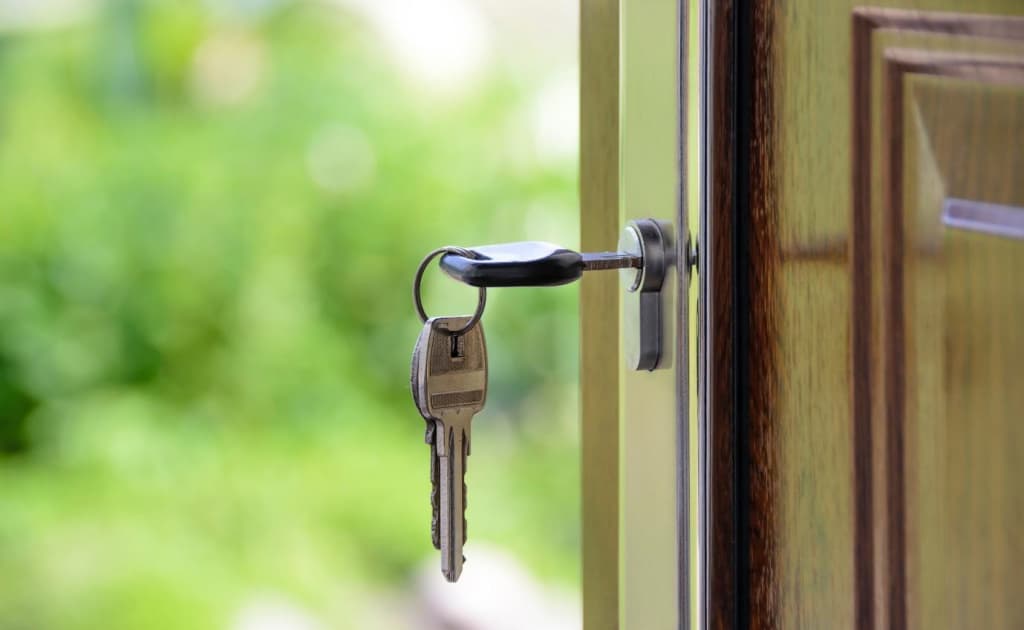
Embarking on a house renovation journey entails a significant time commitment. It’s not just about how much to renovate a house in the UK but also about how long it’ll take. The timeframe of your project can depend largely on the renovation’s extent and complexity.
Smaller, less complex projects can be finished quickly, within a few weeks. However, if your refurbishment plans are more comprehensive, they will require more time. In fact, extensive renovations, such as reconfiguring your house layout or adding an extension, can take three to six months, sometimes even longer.
Keep in mind that these timeframes are rough estimates. Unforeseen complications, such as structural problems uncovered during the renovation, can further extend the project timeline. As you plan your renovation, you must be prepared for these potential delays and plan accordingly.
How Can I Save Money When Renovating My Home?

While you may be curious about how much to renovate a house, it’s equally crucial to consider ways to control your expenditure effectively. Here are some strategies that can help keep your renovation costs within budget without sacrificing the outcome:
1. Plan Your Renovation Well
Planning is at the heart of a cost-effective renovation. Invest ample time in sketching out a clear and detailed plan for your refurbishment project. This includes researching materials, comparing contractor prices, and identifying potential challenges. You might consider seeking professional advice to avoid costly mistakes. This initial time investment can save you money by preventing unanticipated expenses.
2. Do Some Work Yourself
Consider taking on some of the smaller tasks yourself. DIY can significantly cut labour costs. Tasks like painting or tiling are often manageable for DIY enthusiasts. However, remember to evaluate your skills and tools before you start, as substandard work can cost more to rectify.
3. Reuse and Recycle
Why buy new when you can reuse or recycle? Second-hand fixtures, doors, or even bricks and tiles can bring unique character to your space while reducing expenses. The renovation provides a golden opportunity to upcycle. Is that old wood gathering dust in your shed? It could be your next rustic coffee table or wall decor.
4. Shop Smart
The key to affordable renovation lies in smart shopping. Keep an eye out for sales and discounts on materials or furnishings. Bulk buying is another strategy that can lead to savings. But caution is necessary here; you don’t want to buy more than you need.
5. Maintain Good Communication with Your Contractor
Clear, regular communication with your contractor is essential. It prevents misunderstandings that can lead to costly mistakes. Regularly checking the progress ensures that the renovation aligns with your vision and the agreed plan.
Remember, renovation doesn’t have to break the bank. With careful planning and smart decisions, you can manage the cost of renovating a house effectively.
Should I Renovate My House or Move?

For homeowners mulling over a home renovation project, a frequent question is: should I renovate my house or move? The answer lies in your unique needs and circumstances. Both choices have their merits and drawbacks. Here, we break down some of the pros and cons of renovating vs. moving:
Pros and Cons of Moving House
| Pros | Cons |
|---|---|
| Fresh Start: Moving house offers an opportunity for a fresh lease of life, enabling you to choose a property in a better location or a nicer neighbourhood, closer to work and/or schools. | Not Customised: A new house may not meet all your specific needs or tastes. Some modifications or improvements might still be necessary. |
| Avoid Stressful Building Work: By moving house, you circumvent months of disruptive renovation work and coordination of different tradespeople. | Moving Process: Moving is stressful and time-consuming. It involves packing, transporting, unpacking, and settling into a new environment. |
| Opportunity to Downsize: If you don’t need more space, moving house presents a perfect chance to shift to a smaller property and potentially save money, reducing your mortgage. | Not Customised: A new house may not meet all your specific needs or taste. Some modifications or improvements might still be necessary. |
Pros and Cons of Renovating Your House
| Pros | Cons |
|---|---|
| Cost-Effective: The average price to renovate a house is often less than buying a new house. Also, you can stage the renovation, spreading the financial burden over a longer period. | Disruption: Renovation projects are disruptive and could leave you living on a construction site for months. |
| Personalisation: Renovating your house allows you to customise every aspect, ensuring your space aligns with your preferences. This gives you the chance to add those special touches that make a house feel like a home. | Unforeseen Issues: Older homes often hide problems that are not apparent until renovation starts. These could inflate your budget significantly. |
| Familiarity: Renovation means you can stay in the home and area you love, avoiding the hassle of acclimating to a new house, commute, or neighbours. | Overcapitalisation: There’s a risk of overcapitalising if the cost of a renovation exceeds the value they add to your house. It’s important to consider if you are likely to recoup the investment when you eventually sell. |
This discussion will hopefully provide some insight into whether to renovate or move. It’s a complex decision involving both financial and emotional factors. Whatever route you decide, consider how much it costs to completely renovate a house or the costs associated with moving. Ultimately, your choice should align with your budget, lifestyle, and long-term plans.
Other FAQs
Conclusion
In conclusion, understanding how much to renovate a house completely and the house refurbishment cost in the UK is crucial before embarking on any home renovation project. It’s important to remember that costs can vary widely, influenced by factors such as the extent of renovations, the location of the property, and the specific contractors engaged.
Whether you choose to renovate or move will depend on your personal circumstances, but either way, carefully considering the financial implications is key. Keep in mind that effective planning, smart shopping, and the right guidance can help you save money on your renovation project and potentially increase the value of your home.


